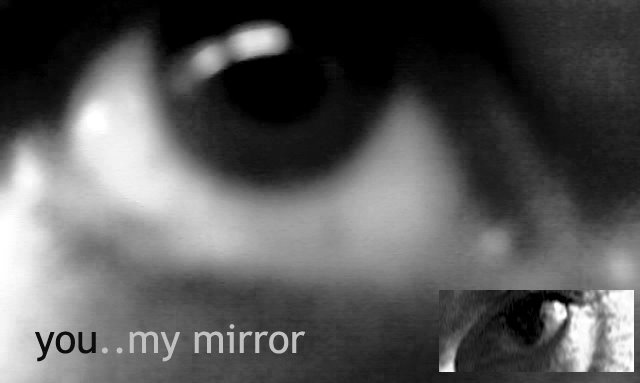 Harold Pinter left just before the end of this year .Lets remember ...in 2005 he wrote....
Harold Pinter left just before the end of this year .Lets remember ...in 2005 he wrote....When we look into a mirror we think the image that confronts us is accurate. But move a millimetre and the image changes. We are actually looking at a never-ending range of reflections. But sometimes a writer has to smash the mirror - for it is on the other side of that mirror that the truth stares at us. I believe that despite the enormous odds which exist, unflinching, unswerving, fierce intellectual determination, as citizens, to define the real truth of our lives and our societies is a crucial obligation which devolves upon us all. It is in fact mandatory.
.......the majority of politicians, on the evidence available to us, are interested not in truth but in power and in the maintenance of that power. To maintain that power it is essential that people remain in ignorance, that they live in ignorance of the truth, even the truth of their own lives. full text http://nobelprize.org/nobel_prizes/literature/laureates/2005/pinter-lecture-e.html
in the comments section of this post you can read the moving text Ariel Dorfman wrote today Saturday Dec 27th for Washington Post and was so kind to send me
Ο Χαρολντ Πιντερ επελεξε να μην δει την αυγη του 2009 εδω στο μεταιχμιο του 2008 εφυγε ... Αξιζει να θυμηθουμε εδω στο μεταιχμιο που τοσα συμβαινουν. ..και τοσα λιγα κατανοουμε... http://www.tvxs.gr/v2325 μερος της συνεντευξης με Ελληνικο υποτιτλο απο την τηλεοραση tvxs ,και στο http://www.youtube.com/watch?v=GY2Z27Y-HJE
H πληρης ομιλια του Πιντερ για την αποδοχη του Νομπελ το 2005 που αξιζει να δειτε αν μιλατε αγγλικα Ακουστε γυρω στο 8ο λεπτο τι λεει για το πολιτικο θεατρο και την πολιτικη σατιρα και βεβαια για τους πολιτικους και τη μανια τους να κρατηθουν στην εξουσια σπερνωντας την αγνοια... Διαβαστε στα σχολια το συγκινητικο κειμενο που εγραψε σημερα Σαββατο ο Χιλιανος συγγραφεας και φιλος Ariel Dorfman για την Washington Post και ειχε την καλοσυνη να μου το στειλει πριν λιγες ώρες
H πληρης ομιλια του Πιντερ για την αποδοχη του Νομπελ το 2005 που αξιζει να δειτε αν μιλατε αγγλικα Ακουστε γυρω στο 8ο λεπτο τι λεει για το πολιτικο θεατρο και την πολιτικη σατιρα και βεβαια για τους πολιτικους και τη μανια τους να κρατηθουν στην εξουσια σπερνωντας την αγνοια... Διαβαστε στα σχολια το συγκινητικο κειμενο που εγραψε σημερα Σαββατο ο Χιλιανος συγγραφεας και φιλος Ariel Dorfman για την Washington Post και ειχε την καλοσυνη να μου το στειλει πριν λιγες ώρες























4 σχόλια:
THE WASHINGTON POST
The World That Harold Pinter Unlocked
By Ariel Dorfman
Saturday, December 27, 2008; A15
It was in Chile, sometime in the early 1960s, that I saw my first
Pinter play, that's where and when I first heard Harold Pinter's name
spoken, that's where and when and how something in my work and life changed
forever.
What was extraordinary about that hour or so that I sat through "The
Dumb Waiter" in Spanish was how immediately recognizable that play by Pinter
was, almost Latin American in its familiarity despite being written
originally in elliptical English by an author from Hackney. As I plunged
into every one of his works in the years that followed, Pinter became
irreplaceably, uniquely inspiring. He showed me how dramatic art can be
lyrical without versifying, can be poetic merely by delving into the buried
rhythms of everyday speech. He whispered to me that we often speak in order
to hide, and perhaps avoid, what we are really feeling and thinking. He was
not afraid of silence or letting his characters lapse into stuttering or
inscrutability. He understood that if you push reality hard enough, it will
end up exposing under its surface another dimension -- fantastic, absurd,
delirious. He suggested that the worst hallucinations of fear are not immune
to the pendulum of humor.
But all of these lessons in dramatic craftsmanship pale next to what
he taught me about human existence and about -- dare I say the word? --
politics.
From that very first play, I felt that Harold Pinter was unfolding a
world that was deeply political. Not in the overt sense (as would happen
later, beginning in the early '80s, in several of his dramas) that his
creatures were affected by who governed them, whether this or that man
controlled the army or gave orders to the police. No, these figments of
Pinter's psyche, at least back in the '60s, did not care to dispute the
public arena, were uninterested in changing the world for better or for
worse. They were, on the contrary, sad citizens of intimacy, obsessed only
with their own survival.
And yet, by trapping us inside the lives of those men and women,
Pinter was revealing the many gradations and degradations of power with a
starkness I had not noticed before in other authors who were supposedly
dedicated to examining or denouncing contingent politics. All power, all
domination and liberation started there, he seemed to be saying, in those
claustrophobic rooms where each word counts, each slight utterance needs to
be accounted for, is paid for in some secret currency of hope or suffering.
You want to free the world, humanity, from oppression? Look inside, look
sideways, look at the hidden violence of language. Never forget that it is
in language where the other parallel violence, the cruelty exercised on the
body, originates.
Two men waiting in a basement to kill somebody. An old tramp laying
claim to a derelict room. A birthday celebration interrupted by intruders. A
woman afraid of being evicted. A son who comes home to his dysfunctional
family accompanied by an enigmatic wife. Primal scenes of betrayal that
could be transpiring anywhere on our planet, embodiments of a vast and
disquieting landscape of dread, the precarious condition inhabited by most
of contemporary humanity, the neglected narrative of the 20th century.
It was perhaps natural that I projected onto those stories born in
England the disturbing shadows of my own Latin America. How many Davies
crossed our Santiago streets? How many Peruvian Roses feared and desired
that visitor from her past? How many killers took their time in the Buenos
Aires cellars of yesterday? How many would await us in the Sao Paulo cellars
of tomorrow? And how to tell those stories, respecting the uncertainty of
those existences on the rim of extinction, mercilessly stripping the masks
forged out of the lives we made for ourselves and yet also be gentle, oh so
tender, with these victims of their own delusions?
Pinter knew how.
And I was haunted by his knowledge, so obsessed that my first book
was an examination of his plays. Many years later, when I began to write for
the theater, it was his influence and his aesthetics that guided me. By the
time I dedicated "Death and the Maiden" to him, we had already become close,
he and I and our wives, Antonia and Angélica, but all our meetings and
dinners and outings together were really a continuation of a conversation I
had started before I had ever been honored by his friendship.
His characters may not have been communicating with one another,
undoubtedly lost in the swamp of their own words and solitude, but Pinter
himself was another matter. He spoke to me on that inaugural occasion and
has done so ever since, with unmistakable clarity, became the contemporary
author who knew how to dispel the terror of my own loneliness merely by
fearlessly naming it. Now that he is gone, I must face a world where I can
no longer dial his number and hear his dry voice, or sit down with this
older brother of mine and lament for hours the newest human rights abuses,
or find his latest poem in the mail. Now I am left with what I discovered
when I was first enraptured by his play more than 45 years ago, left with
that mysterious heart and mind of his with which he will continue to help me
and countless others make sense of the glories and miseries of our time.
Ariel Dorfman, a Chilean American writer and professor at Duke University,
is the author most recently of "Other Septembers, Many Americas."
Ariel Dorfman was so kind to send me the above text. I wish to thank him and also remind that his film-portrait by Peter Raymont, I programmed last year both in Dubai and Rodos Ecofilms won the festivals 2nd award..more here
'http://luciarikaki.blogspot.com/2007/12/memory-and-obligation-to-tell-story-of.html
"define the real truth of our lives and our societies is a crucial obligation" is a mission impossible and therefore a mission worth pursuing. I doubt that one can achieve it in a personal base, but certainly one should try to harmonically fit his version of the truth in the complex puzzle of the society truth. Cells function correctly only by living in peace with one another, close by in tissues, organs, systems and finally a complete body. Why bodies cannot function in loving terms when it comes to societies, cities, countries, the world? I pray that Pinter's death will give birth or revive societies "powerfull mental medicines": people of spirit, people of all arts. We need their tutorial work to remember the "truth", their artistic eye to see the way to reach peaceful societing. We need it theese days.
Farewell to Pinter.
Lucia keep on working the path of truth. Happy New Year.
Dr. Ilias K. Theodoropoulos M.D., M.Sc., Ph.D.
powerfull mentslmedicines,societies in harmony and other utopias worth pursuing thanks you Ilias for being with us in this quest for better new years!!
Δημοσίευση σχολίου